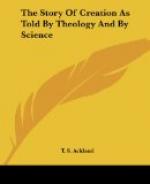An additional reason may, perhaps, be found for the choice of the word “day,” in the accordance of its phenomena with some, at least, of the processes which Moses describes—the dawn, the light slowly increasing to the perfect day, and then fading away gradually into night—these do seem aptly to represent the first scanty appearance, the gradual increase, and the vast development of plants, of the reptiles and of the mammalia, and in the case of the first two classes, their gradual passing away.
But if the word was thus employed in a figurative, and not in its natural sense, we may expect to find some indications in the context that this was the case. Such indications we do find. The fact that the work of Creation was distributed into days, is, in itself, significant. There is no reason to believe that in the opinion of the writer each day’s work tasked to the utmost the power of the Creator. Moses was evidently as well aware as we are, that to Him it would have been equally easy, had He so willed, to call everything into instant and perfect being at a single word. Nor was the detailed description necessary to establish the foundation of all religion—the right of the Creator to the entire obedience of His creature For this the short recapitulation which (ch. ii. 4) prefaces the more detailed account of man’s peculiar relation to his Maker would have been sufficient. Some purpose, however, there must have been for this more particular account which precedes the summary. We may trace two probable reasons. It brings before us the method of the Divine Working in the light of an orderly progress. But beside this, it is of infinite service to us, in enabling us more thoroughly to realize the Fatherly character and ever watchful care of our Creator. As far as that care itself was concerned, it was unimportant whether the work was instantaneous or progressive; but it was very important to us, in so far as it affected our conceptions of God, and of our relations to Him. For all our conceptions of God must rest ultimately on our self-consciousness; we can form no idea of Him except in so far as that idea is analogous to something which comes within the range of our own experience. Now to us and to our feelings there is a very wide difference between an act performed in a moment, and a work over which we have lovingly dwelt, and to which we have devoted our time, our labour, and our thought, for months or years. The one may pass from our mind and be forgotten as quickly as it was performed, but in the other we commonly feel an abiding interest. When therefore the great Creator is represented to us as thus dwelling upon His work, carrying it on step by step, through the long ages, to its completion, we find it far less difficult to realize that other truth, so precious to us, that His care and His tender mercies are over all His works, that the loving watchfulness which still upholds all, and provides for all, is but the continuance of that care which was displayed in the creation of all. Creation, Providence and Grace are blended together in one continuous manifestation of the Divine Wisdom, Power, and Love.




